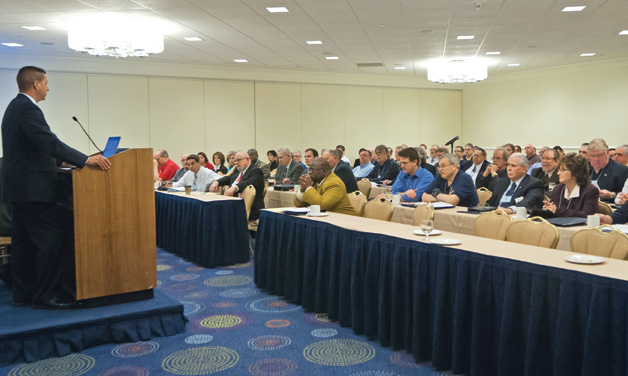
Legion hosts twice-annual sessions to boost awareness, encourage interaction
Lannie Thomas has been an American Legion department service officer (DSO) in Michigan for nearly 30 years. In that time, he’s had to fully understand hundreds of changes in the way VA operates, from administrative adjustments in the filing process to new laws that change eligibility for certain conditions. To stay current, Thomas has attended American Legion Department Service Officer schools since they began in 1984.
The twice-yearly training program – winter in Washington and summer in Indianapolis – keeps service officers informed about changes and provides a forum for them to exchange ideas and share best practices.
Both aspects of DSO school are critical, Thomas says. “Because of the changing environment of VA, we’ve had to change the way we do business. Thank goodness we’ve got a mechanism to keep us updated and motivated to stay on top of things and to hone our skills.
“We’re all doing the same thing, so if I have an issue at my local office, I may call another office and ask them how their regional office is handling it. And if a veteran is being rated one way in one state, then it should be the same in my state. It’s really important to exchange ideas with other states.”
During the three-day school, service officers hear from Legion staff and VA officials during general sessions. They are briefed on topics such as Combat-Related Special Compensation (CRSC), medical legal advocacy and the evaluation of traumatic brain injury (TBI). The school is split into three tracks – beginner, intermediate and advanced – along with smaller groups. Breakout sessions may include presentations on the medical and physical evaluation boards, claims development, benefits delivery at discharge, VA correspondence and Gulf War illness.
“Our hope is that through this school, we’re giving (service officers) the most current information and the tools to help veterans receive the benefits they’ve earned,” says former county service officer Rich Dumanacas, deputy director of the Legion’s Veterans Affairs & Rehabilitation Division. “By bringing them here, we’re saying that we’re open to communication and that we’re here for them. Through face-to-face communication, we’re building a stronger relationship.”
James Fialkowski, a Department of Wisconsin department service officer for more than five years, said his first trip to the school was a bit overwhelming a few years back, but now he sees the program as vital. “One, all the different reforms and changes to regulations in the past six months to a year, as well as all the updates (are covered),” he said. “I can take that information back to my staff. And all of my colleagues are here. I can glean from their knowledge and experiences. Now that I’ve done this for a few years, I feel like I can contribute.”
- Magazine

